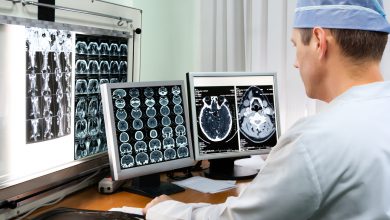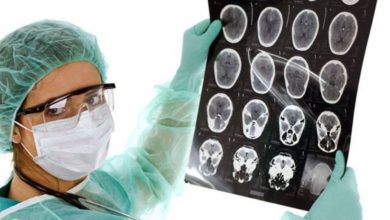Brain tumor: symptoms at an early stage
The content of the article
Today there are many types of brain tumors, and a brain tumor at an early stage, with timely intervention by a specialist, can be cured without serious consequences for the patient. Some tumors are benign in nature, while others are malignant. Primary formations arise directly in the brain tissue, and malignant ones can form in other organs and then spread throughout the body, affecting its most vulnerable areas.
The main cause of tumor development is uncontrolled cell division. The tumor can be localized both in the middle of the skull and in the spinal canal. It can affect healthy tissue far beyond the source of origin. A benign tumor does not spread to other organs (no metastasis), but is localized directly in the brain tissue. Due to the limited space of the skull, sooner or later it can become cancerous.
Symptoms
When diagnosing a disease such as a brain tumor, the symptoms in the early stages in an adult can be varied. This depends on the size of the tumor, the speed of its development, and location. It is noteworthy that men suffer from tumors in the brain much more often than women, and in addition, symptoms in females may differ slightly, depending on the type of tumor.
Common signs and symptoms include the following:
- Headache . In the early stages of tumor development, the headache may be intermittent, but over time it may become constant. Most often it occurs in a lying position or after sleep;
- Nausea and vomiting that is not associated with food intake. As evidenced by patient stories, nausea is periodic and occurs depending on body position;
- Decreased vision, double vision;
- Decreased sensitivity in the limbs;
- Speech impairment, when a person begins to confuse words, and the pronunciation becomes incomprehensible. Such first signs should alert not only the patient himself, but also all loved ones;
- Balance problems;
- Decrease in labor activity;
- Changes in the psyche and its complete destruction;
- The occurrence of seizures. These first symptoms indicate that the tumor is beginning to affect important centers of the brain;
- Hearing impairment;
- Increased drowsiness, stupor. In some cases, the person may fall into a coma.
Causes
Primary tumors develop directly in the brain tissue or in nearby areas. The primary tumor begins its active development at the moment when DNA mutations occur in normal cells. This leads to uncontrolled, accelerated cell division and growth, and they continue to exist even at a time when healthy cells should have died. This leads to tumors in the brain.
Primary tumors are not diagnosed as often as secondary tumors, in which the tumor develops in another organ and then reaches the brain. That is why the first signs of the disease can appear quite late, which will not only complicate the treatment of the disease, but will also negatively affect the future fate of the patient. Today there are many cases of the disease. Their classification is based on the type of tissue from which the tumor forms.
The primary types include the following:
- Ependyoma;
- Meningioma;
- Astrocytoma;
- Glioma or glioblastoma;
- Pineoblastoma and others.
Secondary are neoplasms that develop in any other organ of the body and then metastasize to the brain. In some cases, symptoms of early cancer in adults will depend on various factors and may occur long before the disease itself is diagnosed. In all other cases, a brain tumor is the first sign of cancer that is localized in another area of the body.
Any type of malignant tumor can metastasize to the head, of which the most common types are the following:
- Lungs' cancer;
- Mammary cancer;
- Colon cancer.
Risk factors
To date, experts have not identified the sources that cause genetic mutations, which lead to the development of primary brain tumors, but they have identified factors that can increase the likelihood of this disease.
This may include the following:
- Age. As practice shows, symptoms of a brain tumor in adults manifest themselves depending on the location of the tumor, and occur mainly in people over 45 years of age. But it can still form at a very early age. It is noteworthy that benign cerebellar astrocytomas, as well as medulloblastomas, are most often diagnosed in children;
- Negative effects of radiation. In people who are actively or periodically exposed to radiation, brain cancer is diagnosed much more often. This includes radiation therapy, exposure to atomic bombs, as well as man-made disasters with the occurrence of radioactive radiation. The impact of electromagnetic fields from high voltage lines, mobile phones, microwave ovens, etc. is unproven;
- Exposure to chemicals. People who work in high-chemical environments are at greater risk of developing brain tumors;
- Hereditary factor. A small proportion of cases may occur in those people whose relatives have become prisoners of this disease.
Of course, the first signs of a brain tumor in adults may also indicate other diseases that have nothing to do with cancer, so it is very difficult to make an accurate diagnosis on your own. This can be facilitated by a timely visit to a doctor, who, through research, will be able to make an accurate diagnosis. So, how does the disease manifest itself at an early stage?
Five Symptoms of an Early Stage Brain Tumor
- "Soreness." Severe pain begins to appear in the later stages of cancer, when it begins to actively damage the nerve endings. Early-stage brain tumor pain and symptoms would be more accurately described as “abnormal” or “painful.” Many people recall that several years before the diagnosis of the disease they actually felt unusual discomfort in a certain organ. You need to be very careful if the pain manifests itself in the head, since this disease develops much faster than any other. But basically, such problems are not given much importance, but are simply tried to eliminate them with the help of analgesics or folk remedies;
- Rapid weight loss. Even before a specialist diagnoses an ailment such as a brain tumor, symptoms in the early stages can manifest themselves in the form of rapid, seemingly causeless weight loss. Basically, a person can lose a couple of tens of kilograms in a few months. This is due to the fact that it synthesizes and disrupts normal metabolic processes;
- Muscle weakness. The faster cancer develops, the more it releases waste products into the blood, which leads to intoxication of the body. As a result, the person begins to feel nausea and increased weakness. If a person does have an early stage brain tumor, symptoms may include anemia, which also causes general weakness;
- Increased body temperature. Very often, the first symptoms of the disease appear as an unexplained elevated body temperature. This is explained by the fact that it negatively affects the immune system, which as a result reacts to it. With this disease at a later stage, increased body temperature can be the result of chronic poisoning of the body, as well as significant disturbances in metabolic processes;
- Changes in skin and hair. Outwardly, this manifests itself in the form of disturbances in the normal metabolic process. For example, with adrenal cancer, which can metastasize to the brain, the skin darkens, and with liver cancer, it turns yellow. Hair falls out severely and nails break due to thyroid tumors, which also quickly affect areas of the human brain.
When to contact a specialist
When the first signs of the disease begin to appear, you should immediately consult a doctor.
Diagnostics
If there is a suspicion of the development of a brain tumor, the attending physician may prescribe the following diagnostic procedures:
- Neurological examination. The patient's visual acuity and hearing are checked, and his reflexes and coordination are monitored. Problems that will arise during diagnosis will tell the specialist in which part of the organ the tumor is localized;
- MRI . This procedure is almost always used to diagnose the disease in question. An MRI uses magnetic and radio waves to help generate an image of a patient's infected cells. In some cases, a special contrast agent may be injected into the patient’s vein before an MRI. This diagnostic method allows the specialist to obtain the most accurate picture of what is happening and prescribe the necessary treatment;
- Research into the diagnosis of cancer that has arisen in other organs. If a specialist suspects that a tumor in the head has formed as a result of metastasis of cancer that is localized in another organ of the patient, then additional studies may be prescribed, for example, a chest x-ray if there is a suspicion of lung cancer;
- Biopsy. This method can be used as part of an operation to remove a tumor, or with the use of a needle. A biopsy involves drilling a small hole in the skull through which a small part of the tumor can be removed for further study. The information obtained helps to prescribe the correct treatment for the patient.
Treatment
Individual treatment is selected for each patient, which depends on the nature of the tumor, its location, size, as well as the general condition of the person. The main methods of treating the disease can be identified:
- Surgical intervention. If the location of the tumor provides convenient access to it for a specialist, the latter will try to remove it as much as possible. In some cases, the tumor may be small in size with a clear boundary between healthy tissues. In this case, the operation will be completely justified. Otherwise, surgery can be risky, especially if the tumor is located near sensitive areas of the brain and has already penetrated them. Even a small portion of infected tissue removed can have a beneficial effect on the signs and symptoms of the disease;
- Radiation therapy . This method involves the use, for example, of x-rays, which allows you to destroy diseased cells. Mostly they use a device that is placed outside the patient’s body, but there are also cases when it is placed inside the body and placed next to the tumor. External beam radiation therapy can focus on the tumor or affect the entire diseased organ of the patient. Irradiation of the entire head of a person is prescribed as a prophylaxis , which helps destroy those cells that were not removed during surgery. Side effects of this method depend on the type and dose of radiation. Patients mainly complain of headaches, fatigue, and scalp irritation;
- Chemotherapy . This method involves the use of medications that can destroy tumor cells. The drugs can be taken orally or injected into a patient's vein, allowing the drug to travel throughout the body. If necessary, the medicine can be injected into the patient's spine, allowing treatment directly to the central nervous system.
Rehabilitation
Rehabilitation can become an important part of treatment, because the disease can develop in those areas that are responsible for motor skills, vision, speech and thought processes. In some cases, the brain can recover on its own after an injury, but this requires time and a lot of patience.
Prevention
It is quite difficult to talk about the prevention of such a disease, because experts have not yet fully identified the main causes of the occurrence of tumors in the head. The only thing that is known for certain is that if a resource is depleted, the body can succumb to any disease. Speaking of liver and lung diseases, unhealthy food and abuse of alcohol and tobacco products have a detrimental effect. In the case of the brain, stress and lack of sleep have the most negative impact. If we add to the list treatment with medications without consulting a specialist and abuse of substances that help overcome fatigue (energy drinks, etc.), then we end up with a whole “bouquet” of ailments that can attack the brain.
Complications
Brain cancer is recognized as a very serious disease, as it can affect the most important areas of the brain, which are responsible for functions in the body necessary for normal life. Depending on the location and nature of the tumor, the following complications may occur:
- Weakness. If the disease affects the area of the brain that controls limb movement, the patient may experience weakness in that organ. The discomfort is comparable to that which occurs after a stroke;
- Decreased vision. If the disease affects the part that processes visual information, severe vision problems may occur. The patient may not only experience blurred vision or double vision, but also complete loss of vision;
- Headache. The disease in question is the initiator of increased blood pressure, which leads to headaches. They can be periodic or constant, and will be accompanied by nausea and vomiting. It can occur as a result of both the impact of the tumor itself and the accumulation of fluid inside the organ (hydrocephalus);
- Changes in behavior. The disease can lead to significant changes in a person’s behavior, as well as destroy his psyche;
- Hearing loss. If the tumor, at the time of its development, had a strong impact on the auditory nerves, then the person may lose the hearing of the ear on the side of the affected area;
- Cramps. Irritation of the organ, which provokes a neoplasm, causes seizures;
- Brain coma. This is the final complication of the negative effects of cancer, which in most cases ends in death.
Please rate the article:

 (2 ratings, average: 4,00 out of 5)
(2 ratings, average: 4,00 out of 5)



